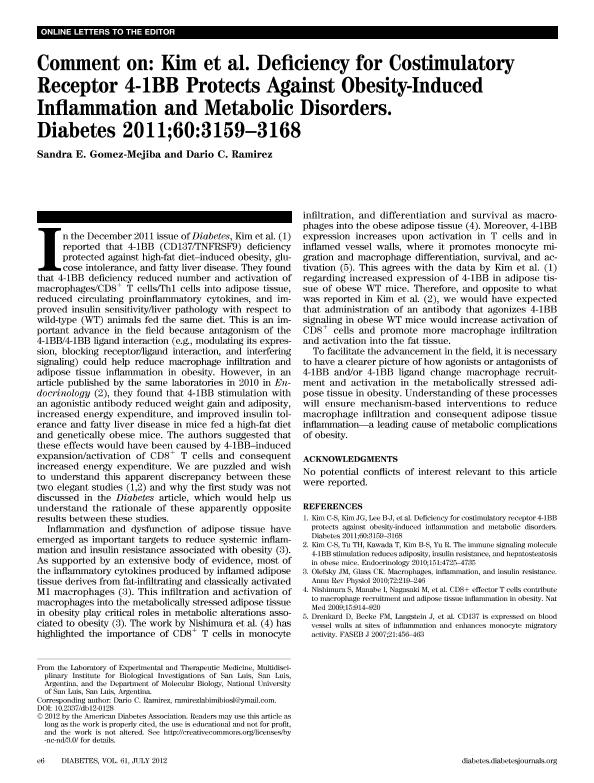Artículo
Comment on: Kim et al. Deficiency for costimulatory receptor 4-1BB protects against obesity-induced inflammation and metabolic disorders. Diabetes 2011;60:3159-3168
Fecha de publicación:
07/2012
Editorial:
American Diabetes Association
Revista:
Diabetes
ISSN:
0012-1797
Idioma:
Inglés
Tipo de recurso:
Artículo publicado
Clasificación temática:
Resumen
In the December 2011 issue of Diabetes, Kim et al. [1] reported that 4-1BB (CD137/TNFRSF9) deficiency protected against high fat diet (HFD)-induced obesity, glucose intolerance and fatty liver disease. They found that 4-1BB deficiency reduced number and activation of macrophages/CD8+ T cells/Th1 cells into adipose tissue, reduced circulating pro-inflammatory cytokines, and improved insulin sensitivity/liver pathology with respect to wild-type animals fed the same diet. This is an important advance in the field because antagonism of the 4-1BB/4-1BB ligand interaction (e.g., modulating its expression, blocking receptor/ligand interaction and interfering signaling) could help reduce macrophage infiltration and adipose tissue inflammation in obesity. However, in a paper published by the same laboratories in 2010 in Endocrinology [2] they found that 4-1BB stimulation with an agonistic antibody reduced weight gain and adiposity, increased energy expenditure and improved insulin tolerance and fatty liver disease in HFD-fed mice and genetically obese mice. The authors suggest that these effects would have been caused by 4-1BB induced expansion/activation of CD8+ T-cells and consequent increased energy expenditure. We are puzzled to understand this apparent discrepancy between these two elegant studies [1, 2] and why the first study was not discussed in the Diabetes paper, which would help us understand the rationale of these apparently opposite results between these studies. Inflammation and dysfunction of adipose tissue have emerged as important targets to reduce systemic inflammation and insulin resistance (IR) associated to obesity [3]. As supported by an extensive body of evidence, most of the inflammatory cytokines produced by inflamed adipose tissue derives from fat-infiltrating and classically-activated M1 macrophages [3]. This infiltration and activation of macrophages into the stressed adipose tissue in obesity play critical roles in metabolic alterations associated to obesity [3]. Nishimura’s work [4] has highlighted the importance of CD8+ T-cells in monocyte infiltration, and differentiation and survival as macrophages into the obese adipose tissue [4]. Moreover, 4-1BB expression increases upon activation in T-cells and in inflamed vessel walls, where it promotes monocyte migration and macrophage differentiation, survival and activation [5]. This agrees with Kim’s data regarding increased expression of 4-1BB in adipose tissue of obese wild type mice [1]. Therefore and opposite to what reported in [2], we would have expected that administration of an antibody that agonizes 4-1BB signaling in obese wild-type mice would increase activation of CD8+ cells and promote more macrophage infiltration and activation into the fat tissue. To facilitate the advancement in the field it is necessary to have a clearer picture of how agonists or antagonists of 4-1BB and/or 4-1BB ligand change macrophage recruitment and activation in the metabolically-stressed adipose tissue in obesity. Understanding of these processes will ensure mechanism-based interventions to reduce macrophage infiltration and consequent adipose tissue inflammation—a leading cause of metabolic complications of obesity.
Palabras clave:
CD137
,
MACROPHAGE
,
ADIPOSE TISSUE INFLAMMATION
,
INSULIN RESISTANCE
Archivos asociados
Licencia
Identificadores
Colecciones
Articulos(IMIBIO-SL)
Articulos de INST. MULTIDICIPLINARIO DE INV. BIO. DE SAN LUIS
Articulos de INST. MULTIDICIPLINARIO DE INV. BIO. DE SAN LUIS
Citación
Gomez-Mejiba, Sandra Esther; Ramirez, Dario; Comment on: Kim et al. Deficiency for costimulatory receptor 4-1BB protects against obesity-induced inflammation and metabolic disorders. Diabetes 2011;60:3159-3168; American Diabetes Association; Diabetes; 61; 7; 7-2012; e6 - e6
Compartir
Altmétricas




